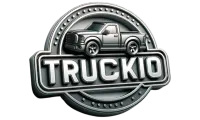Yes, tonneau covers can go through a carwash, but it depends on the type. Soft covers (vinyl or canvas) may get damaged. Hard covers (aluminum or fiberglass) can usually handle it. Check manufacturer guidelines for specifics.
Factors To Consider Before Taking A Tonneau Cover Through A Carwash
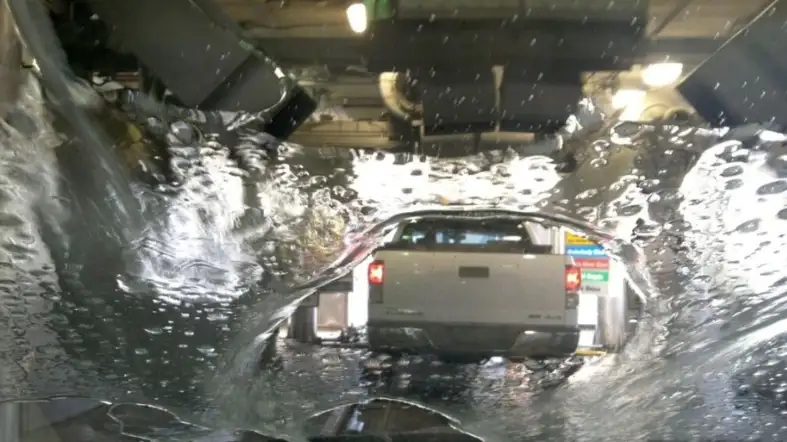
Evaluate the Carwash Type
Not all carwashes are created equal, and their design can significantly impact the compatibility with tonneau covers.
There are primarily two types of carwashes: touchless and friction-based.
Touchless car washes use high-pressure water and cleaning agents, while friction-based carwashes employ rotating brushes or cloth to clean the vehicle.
Determine the type of carwash you plan to use and assess how it might interact with your tonneau cover.
Verify Water Resistance Features
Different tonneau covers have varying degrees of water resistance.
Verify whether your tonneau cover has adequate water resistance features such as overlapping seams, weather seals, or integrated drainage systems.
These features help prevent water from seeping into the truck bed and damaging any cargo or equipment.
Understanding your tonneau cover’s water resistance capabilities will allow you to assess its compatibility with the carwash environment.
Consider Tonneau Cover Material
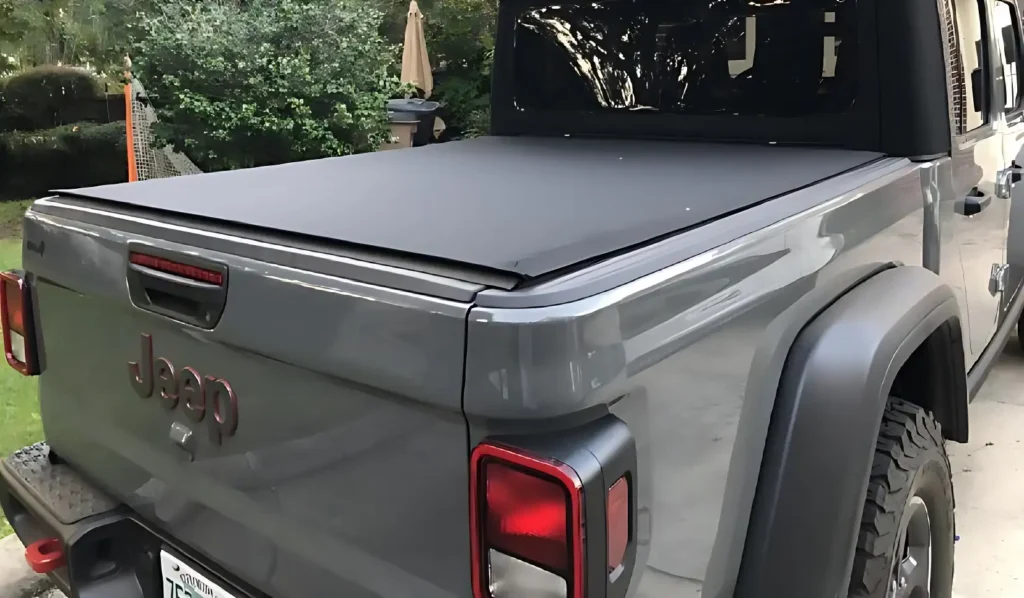
Tonneau covers come in various materials, such as vinyl, aluminum, fiberglass, or canvas.
The material of your cover can influence its ability to withstand the rigors of a carwash.
Some materials may be more susceptible to damage from high-pressure water, abrasive brushes, or cleaning chemicals.
Inspect Tonneau Cover Condition
Before subjecting your tonneau cover to a carwash, thoroughly inspect its condition.
Look for any existing damages, loose components, or weakened areas that could worsen during the washing process.
Pay close attention to the seals, hinges, and latches, as they may be vulnerable to the force or chemicals used in the carwash.
Address any necessary repairs or maintenance before proceeding.
Seal Potential Entry Points
To minimize the risk of water infiltration, take precautions to seal potential entry points on your tonneau cover.
Use weather stripping or silicone sealant to reinforce vulnerable areas such as the edges, hinges, or locks.
Ensuring a tight seal can help protect your vehicle’s cargo bed from water damage caused by the carwash process.
Remove Loose Items
Before entering the carwash, remove any loose items from your vehicle’s cargo bed.
Securely store or fasten down any objects that could become dislodged or damaged during the washing process.
Loose items can pose a risk to both your tonneau cover and the carwash equipment, so it’s important to take this step to prevent accidents or unnecessary damage.
Test with a Gentle Carwash
If you’re uncertain about the compatibility of your tonneau cover with carwashes, consider starting with a gentle or hand wash.
This allows you to assess how well your coverage handles the washing process without subjecting it to the potential hazards of more aggressive carwash types.
Observe the condition of the tonneau cover and evaluate whether it’s safe to continue using carwashes in the future.
Opt for Touchless or Soft-Touch Carwashes
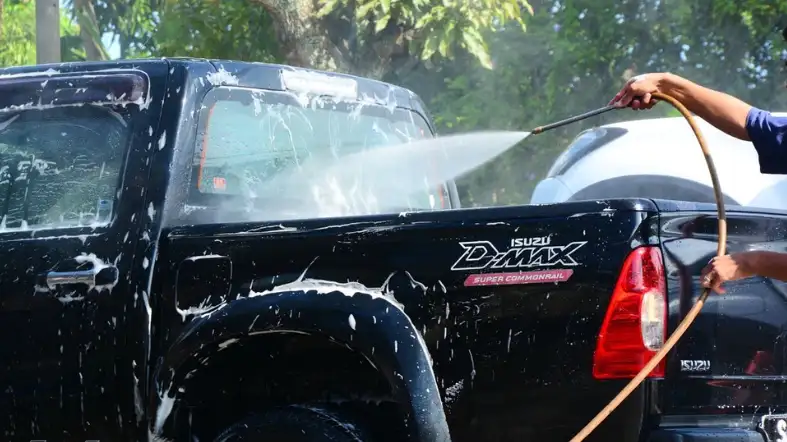
Consider choosing a touchless or soft-touch carwash. Touchless car washes utilize high-pressure water jets without physical contact, minimizing the risk of damage to your tonneau cover.
On the other hand, soft-touch carwashes use cloth or foam brushes that are generally gentler on tonneau covers.
However, ensure that the brushes used in soft-touch carwashes are specifically designed to be safe for tonneau covers.
By selecting these carwash methods, you can reduce the chances of physical damage to your tonneau cover.
Check the Manufacturer’s Guidelines
Before venturing into a carwash, it’s essential to review the manufacturer’s guidelines for your specific tonneau cover.
Each cover may have its own set of recommendations and restrictions regarding carwash compatibility. If it ask you to remove the tonneau cover for washing, do so.
Carefully read the user manual or visit the manufacturer’s website to understand their guidelines. Ignoring these instructions could lead to damage or even void the warranty.
Take Necessary Precautions
When you decide to take your tonneau, cover through a carwash, following additional precautions is crucial to minimize risks.
Lower your vehicle’s windows slightly to equalize the pressure and prevent potential damage to the cover.
Drive slowly and carefully during the carwash process to avoid sudden movements that could strain or dislodge the cover.
Be vigilant and ready to stop the carwash if you notice any signs of trouble or excessive stress on the tonneau cover.
Carwash Methods and Their Impact on Tonneau Covers
Touchless Carwashes
Touchless car washes utilize high-pressure water jets and detergents to clean your vehicle without physical contact.
While these carwashes are generally safe for tonneau covers, the forceful water jets can be a concern.
The high-pressure water may penetrate under the tonneau cover and wet your truck bed.
If your tonneau cover lacks adequate water resistance features, this could lead to water seepage, potentially damaging any cargo or equipment stored in the truck bed.
Therefore, it’s important to ensure that your tonneau cover has proper seals and weatherproofing to minimize the risk of water intrusion.
Soft-Touch Carwashes
Soft-touch carwashes employ cloth or foam brushes to clean your vehicle physically. However, the rotating brushes used in these carwashes can pose a risk to tonneau covers.
Delicate tonneau cover materials may get caught or torn by the brushes, leading to damage.
If you have a soft-touch carwash in mind, it’s crucial to verify that the brushes used are gentle and won’t cause harm to your tonneau cover.
Additionally, ensure that your tonneau cover is securely fastened to prevent it from flapping or dislodging during washing.
Self-Serve Carwashes
Self-serve car washes allow you to wash your vehicle using a pressure washer and cleaning products provided on-site.
While these carwashes offer more control over the washing process, they still carry certain risks for tonneau covers.
The forceful pressure washer spray can penetrate the tonneau cover and wet the truck bed.
It’s important to take precautions by properly securing your tonneau cover and assessing its water resistance capabilities before using a self-serve carwash.
Additionally, avoid using excessive pressure that could cause damage to the cover or compromise its integrity.
Handwashing
Handwashing your vehicle can be the safest option for protecting your tonneau cover.
By washing your truck manually, you have complete control over the cleaning process and can avoid potential risks associated with automated carwashes.
Handwashing allows you to focus on the tonneau cover, ensuring that it remains dry and undamaged.
However, remember that excessive force or harsh chemicals during handwashing can still harm the tonneau cover.
Use gentle cleaning products, soft brushes, or microfiber cloths to maintain the cover’s quality.
Potential Risks Associated with Carwash for Tonneau Covers
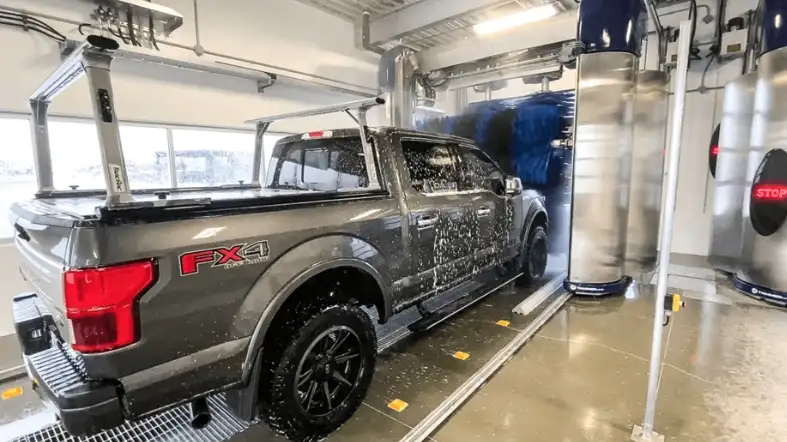
Water Intrusion
Water intrusion is one of the primary risks associated with carwash for tonneau covers.
Carwashes often involve high-pressure water jets or rotating brushes that can force water under the tonneau cover and into the truck bed.
If your tonneau cover lacks sufficient water resistance features or if it is not properly sealed, this can result in water seeping into the bed, potentially damaging any cargo or equipment stored there.
To mitigate this risk, ensure your tonneau cover has proper weather seals and integrated drainage systems to prevent water intrusion.
Physical Damage
Another risk during carwash is the potential for physical damage to the tonneau cover.
In automated carwashes, rotating brushes or other cleaning mechanisms can threaten delicate tonneau cover materials.
These brushes may catch or tear the cover, leading to unsightly damage.
Additionally, if the tonneau cover is not securely fastened, the powerful water sprays or brushes can cause the cover to flap around or even get dislodged, resulting in further damage.
To minimize the risk of physical damage, double-check that your tonneau cover is tightly secured and consider opting for carwash methods that use gentler cleaning mechanisms.
Chemical Reactions
Carwash facilities often use various cleaning agents, detergents, and chemicals to achieve a thorough cleaning.
However, some of these substances may not be compatible with certain tonneau cover materials.
Harsh chemicals can cause discoloration, fading, or even deterioration of the cover.
It’s important to be mindful of the cleaning agents used in the carwash and their potential impact on your tonneau cover.
If you have concerns about chemical reactions, consider handwashing your vehicle using mild, non-abrasive cleaners specifically formulated for tonneau covers.
Existing Damage or Wear
If your tonneau cover already has existing damage or wear, subjecting it to a carwash can exacerbate the problem.
For instance, loose stitching, cracks, or tears may worsen due to the forceful water sprays or physical contact with cleaning equipment.
Before taking your truck through a carwash, thoroughly inspect your tonneau cover for any visible signs of damage.
If you notice any issues, it’s advisable to address them beforehand or choose alternative cleaning methods that minimize the risk of further damage.
Warranty Concerns
Some tonneau cover manufacturers may have specific guidelines or restrictions regarding carwash usage.
Failing to adhere to these guidelines may void any warranty coverage you have.
To protect your warranty and ensure the longevity of your tonneau cover, familiarize yourself with the manufacturer’s recommendations regarding carwash usage.
Follow their instructions and guidelines to maintain the cover’s warranty and minimize potential risks.
Alternative Cleaning Methods for Tonneau Covers Instead Caswah
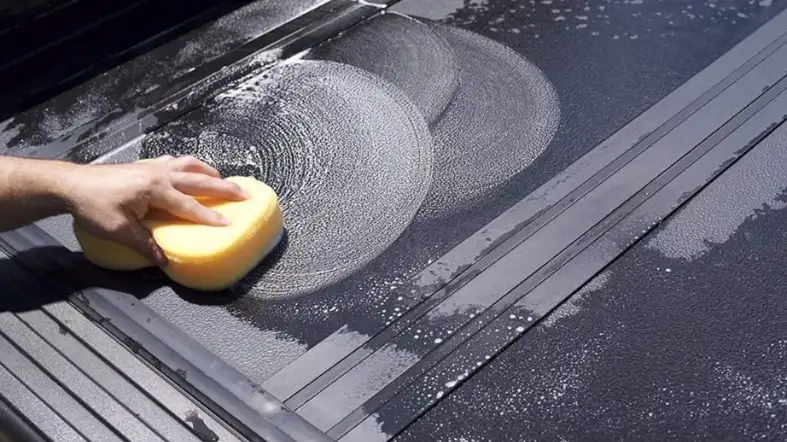
Vinegar Solution
One alternative cleaning method involves using a vinegar solution. Start by diluting white vinegar with water in a 1:1 ratio.
Then, dip a soft cloth or sponge into the solution and gently scrub the tonneau cover, paying extra attention to any stains or dirt buildup.
The vinegar’s acidic properties will help break down grime and remove stubborn stains.
Rinse the tonneau cover thoroughly with clean water and let it air dry. This method is effective for regular maintenance cleaning and can be repeated as needed.
Baking Soda Paste
Another effective alternative cleaning method is using a baking soda paste.
Create a paste by combining baking soda with a small amount of water until you achieve a thick consistency.
Apply the paste to the tonneau cover, focusing on areas with stains or discoloration.
Gently scrub the paste into the surface using a soft brush or sponge. Baking soda is a natural abrasive that can help remove tough stains and odors.
After scrubbing, rinse the tonneau cover with water and allow it to dry completely.
Mild Dish Soap and Water
For a simple yet effective cleaning solution, you can use mild dish soap and water.
Fill a bucket or basin with warm water and add a few drops of dish soap. Mix the solution to create a soapy mixture.
Dip a soft cloth or sponge into the soapy water and gently scrub the tonneau cover. Pay attention to any areas with dirt or grime, applying a bit more pressure if necessary.
Once you’ve cleaned the entire cover, rinse it thoroughly with clean water and let it air dry.
Isopropyl Alcohol
Isopropyl alcohol can be a useful alternative cleaning agent for tonneau covers. Dilute isopropyl alcohol with water in a 1:1 ratio, similar to the vinegar solution.
Moisten a soft cloth or sponge with the diluted alcohol and gently wipe the tonneau cover, targeting any stains or residue.
The alcohol will help dissolve oils and dirt, leaving your tonneau cover clean and fresh. Rinse the cover with water afterward and let it dry completely.
Pressure Washer
If you have access to a pressure washer, it can be an effective tool for cleaning your tonneau cover.
Start by removing loose dirt and debris from the cover’s surface with a soft brush or broom.
Then, set the pressure washer to a low or medium setting to avoid damaging the cover.
Stand at a reasonable distance and spray the tonneau cover, moving the wand in a sweeping motion.
Be cautious not to spray at a close range or with excessive pressure, as it may cause tears or damage to the cover. Once you’ve thoroughly rinsed the cover, allow it to air dry.
FAQs
Final Words
When it comes to keeping your truck bed protected and looking its best, you’ll be pleased to know that tonneau covers can confidently go through a carwash.
Their durable design ensures they can withstand the washing process without any issues. Just make sure to follow the manufacturer’s guidelines for optimal care.
Keep your truck bed pristine with the convenience of carwash-friendly tonneau covers.
